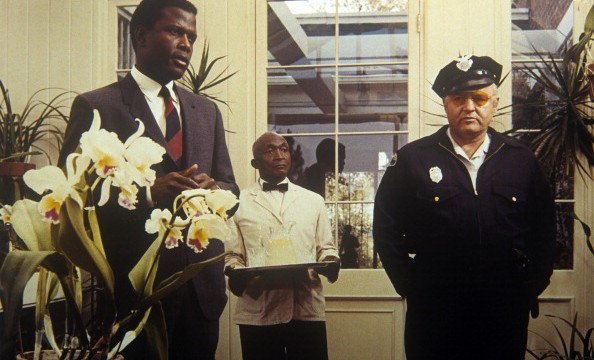For many years, when Hollywood needed a Dignified Black Man, they called on Sidney Poitier. The characters he played were often too good to be true, because the whole point was that the things that happened to them could not be their fault. On the other hand, there were still roles more like Edge of the City and The Defiant Ones, men with a touch of something untoward in their natures. It’s just that as the Dignified Black Man roles became more common, the Man With a Past roles faded away.
I think the only role of his that I saw growing up was Mark Thackeray in To Sir, With Love. Maybe A Raisin in the Sun in high school—I know we read it, but I don’t think I saw that version until recently. (Starts with “R.”) I’ve long been familiar with his work, in principle at least, but I hadn’t seen many of his movies. I’ve still only seen a handful of them. It strikes me that he is in many ways more known for who he is than what he’s done.
It’s unjust. I’ll admit I’m still behind on his films—he made 43 over a stretch of fifty years, starting as “Night Club Extra” in Sepia Cinderella; I’ve seen about a dozen of them—but I haven’t seen a bad performance yet. Some of the movies aren’t great, I grant you, but the performances are often better than the movies deserve. He often played (he hasn’t been in a film since 1997) men with a core of anger, even a fair few of the “too good to be true” types. He knew when to let the anger out and when not.
Let’s take the most stereotypical of Poitier performances for a moment. Let us examine Guess Who’s Coming to Dinner, wherein he forces a nice, liberal Hepburn-Tracy pairing to confront the reality of their own racism. He’s a doctor for the UN. A nice, quiet, clean, dignified man who falls deeply in love with a young white woman. And even there, he gets to be angry. He gets to be angry at the attitude that he’s only so good and no better. He can be a doctor, but he can’t be the husband of the woman he loves. He fights the fear of his own family for what matters to him.
No, he isn’t allowed to be angry at his beloved’s parents. Not in 1967. You couldn’t be a young black man angry at Katharine Hepburn, and you sure as hell couldn’t be angry at a dying Spencer Tracy. But you were allowed to be angry at the hypocrisy, and the only way to be sure that it was because you were black was if you were as pure and as perfect as Dr. John Prentice, WHO. It didn’t hurt if you looked like Sidney Poitier, too, who managed to be both sexy and sombre at the same time.
Because I’ve got to be honest with you. Poitier is the first person we’ve covered where I really want to spend some time rhapsodizing without the “fifty years ago” caveat. Angela Lansbury, my whole life, she’s looked like someone’s grandmother. Kirk Douglas? Has always been attractive in an idiosyncratic way, stretched in the face, and he’s definitely looking his age. Sidney Poitier? Maybe it’s partially the voice, which is a wonderful voice, but he’s just a wildly attractive man. Fading a bit now that he’s almost ninety, but still.
Even if Sidney Poitier is remembered for nothing else, he’ll be remembered for 1963 and Lilies of the Field. I have to level with you—the category wasn’t strong in 1963. I’d say that Lilies of the Field is the shift in his career from Angry Young Man to Dignified Black Man; Lilies ends with both. But whatever else it has, it has the first time a black man won for Best Actor. It might’ve been the second, if Tony Curtis hadn’t split the vote on The Defiant Ones.

